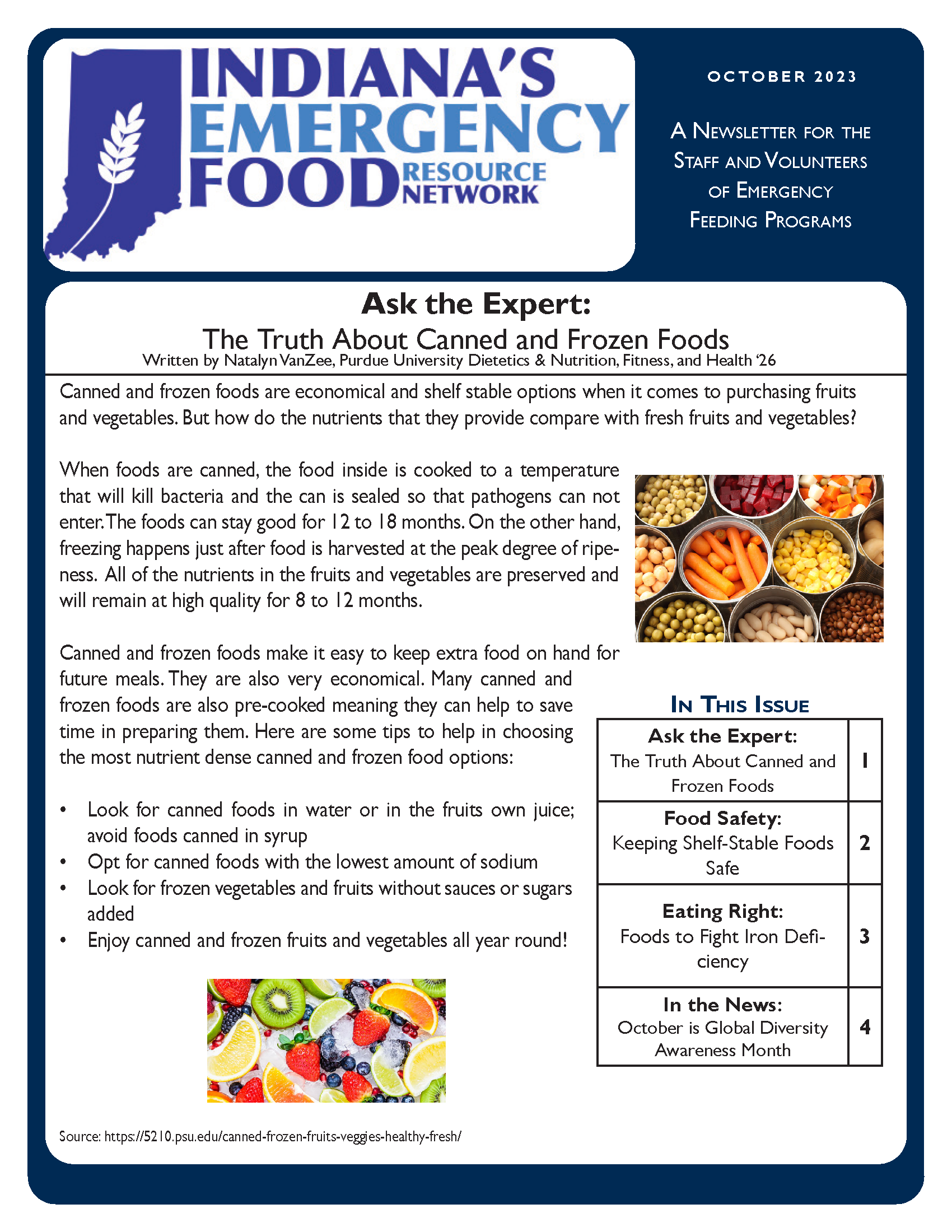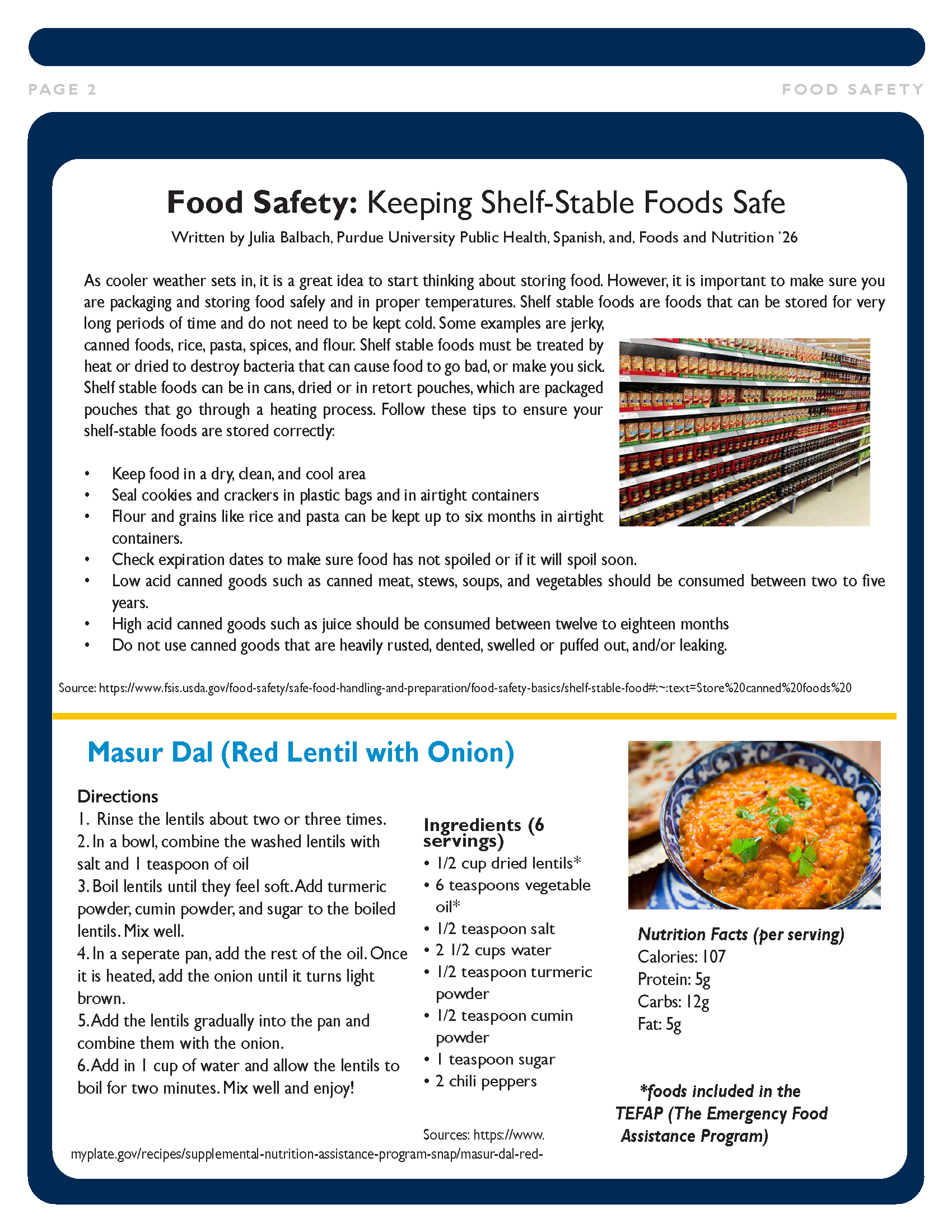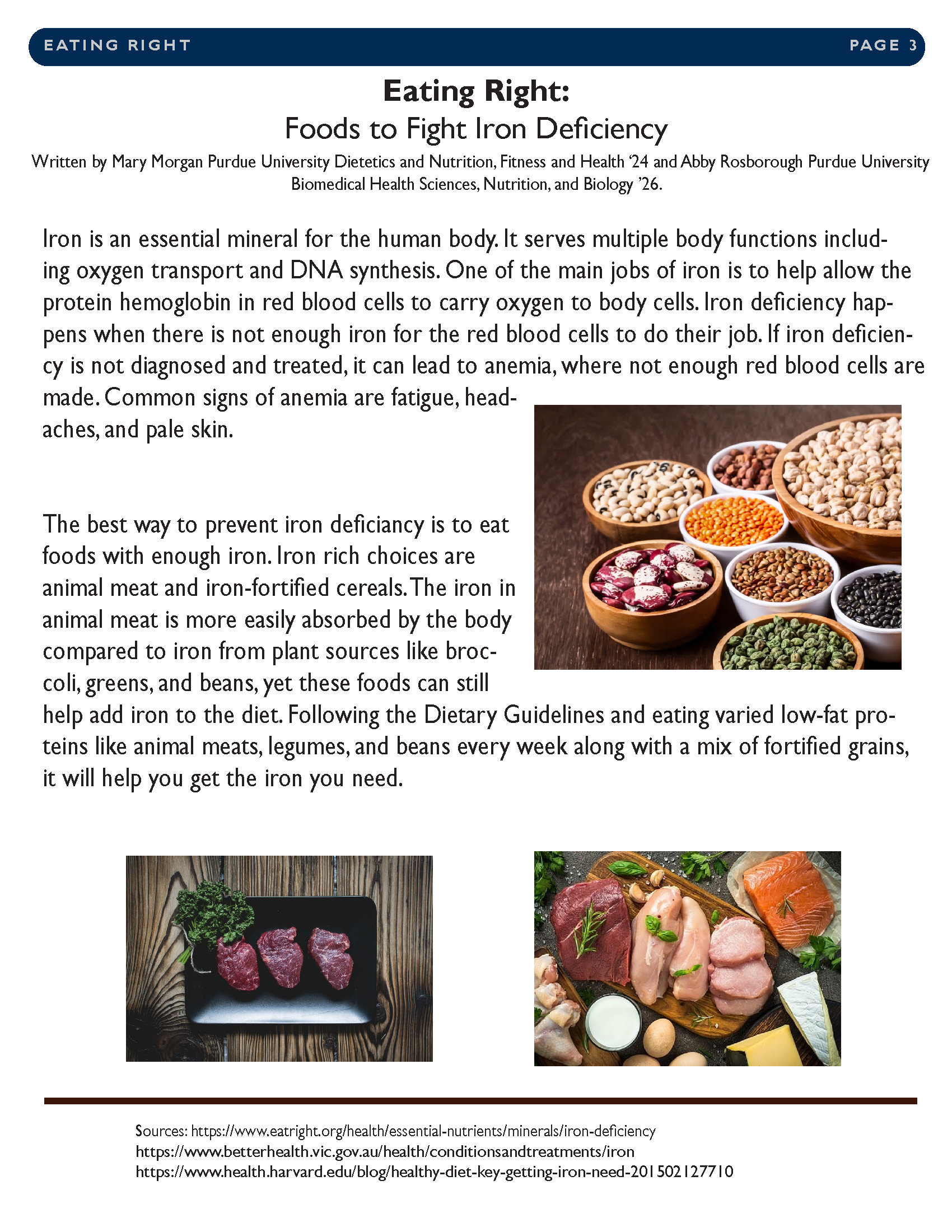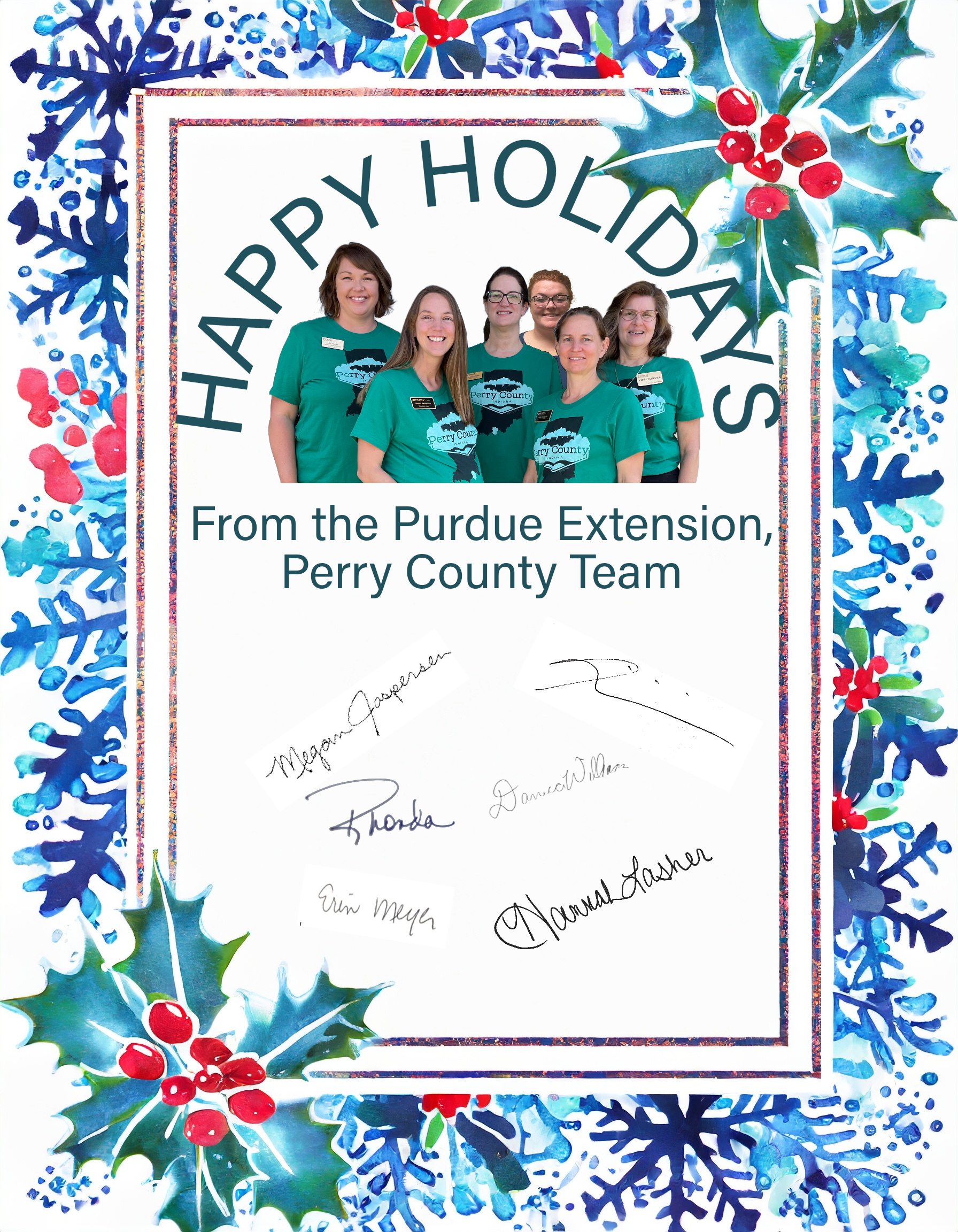2023 Nov/Dec Perry County Extension Newsletter
Perry County 4-H and Youth Development News
Hello Perry County 4-Hers! My name is Hannah Lasher and I am the new 4-H Youth Development Extension Educator. I am so excited to meet everyone and kick off a great year for 4-H. I will be sending out a needs assessment to the community in order to see where specifically the youth needs/wants more programming. My main focus will be reaching out to the youth themselves, however, if adults want to submit the survey as well, I will gladly take them!
A little bit about me, I am from Tennyson, IN and recently moved to Perry County after getting married to my husband, Thomas Lasher, in October 2022. I was a 10 year 4-Her in Warrick County and showed various projects throughout my years in 4-H. I participated in sewing, fashion revue, photography, woodworking, scrapbooking, art, (using mediums such as watercolor, paint, colored pencil, etc.) foods, horse poster, goat poster, showed my horse and showed my goats. In my time as a 4-Her I was the President of my club The Yellowbanks Mixers for 4 years. I learned several valuable skills as a 4-Her and developed a passion for learning and leadership throughout the 10 years I was involved. Throughout my years I attended 4-H camp, competed in various events at the fair, and even won a few. Pictured below is my team that won hog wrestling and my team that won mud volleyball.
I graduated from the University of Evansville with my Masters of Public Health in 2020. There, I was involved in College Mentors for Kids, Alpha Omicron Pi, Order of Omega, National Society of Leadership and Success, Recruitment Counselor, Panhellenic Executive Board, Public Health Student Association and Admission Ambassador. I believe that 4-H shaped my leadership qualities in order to not only participate in every student lead association I was in but also pushed me to be a leader among those groups. I am very passionate about 4-H and all the wonderful qualities it brings out in those involved! I am excited to continue that passion with my current role as the 4-H Youth Development Extension Educator.
Perry County Ag News
Purdue Extension - Perry County
Educator's Corner
Harvest is wrapping up in Perry County. Overall it has been a good year for Perry County farmers with strong yields and a generally good growing season. While we had some dry spells, overall we had timely rain throughout most of the county. Input costs continue to be high, putting a strain on farm profits while corn and soybean prices have declined since the beginning of the year, putting a greater strain on farm balance sheets.
As we move into winter, livestock producers should test hay stores so they can balance rations accordingly. There is a hay probe at the Extension Office that is available for Perry County residents to check out and use.
It’s time to winterize gardens. Remove dead plants from the garden. Remains of this year’s crop can potentially carry harbor diseases that can be carried over to next year. It’s fine to compost plant remains, but consider using yard waste compost on your garden and garden waste compost on your yard to prevent plant disease transmission within your garden.
Monitor temperatures and bring sensitive plants inside when nights get too cold. Ensure that plants brought inside get adequate light and moisture. Indoor conditions are often much dryer than outdoor conditions.
Have a wonderful holiday season!
- Sara
Dec. 7 Perry County PARP to Focus on Biologicals
By: Sara Dzimianski
Biologicals are the hot new product marketed by ag companies for enhancing crop production. Due to minimal regulation of these products, and no oversight from the EPA/FDA, it can be difficult to sort through the hype and assess what is actually effective.
Dr. Shaun Casteel, Purdue University Extension Soybean Specialist has focused research on biologicals to assess what actually works. He will share the results of the workshop at the Perry County PARP on December 7 at 6:30 PM at the Perry County 4-H Fairgrounds located at 99 Roy Fenn Drive, Tell City. Call 812-547-7084 for more information. Preregistration is not required.
Other upcoming PARP programs:
Nov. 6 Martin County PARP (Loogootee) Ph.(812)295-2412
Nov. 6 Daviess County PARP (Washington) Ph.(812)254-8668
Nov. 8 Crawford Co. Area 2 PARP (Leavenworth) Ph.(812)338-2352
Nov. 8 Lawrence Co. Area 2 PARP (Bedford) Ph.(812)723-7107
Nov.13 Knox County PARP (Vincennes) Ph.(812)882-3509
Nov. 13 Pike County PARP (Petersburg) Ph.(812)354-6838
Dec. 12 Precision Farming Solutions Workshop & PARP (H’burg) Ph.(812)684-9700
Dec. 12 Knox County PARP Workshop (TBD) Ph.(812)882-3509
Dec. 12 Gibson County PARP Workshop (Princeton) Ph.(812)385-3491
Free Soil Sampling Program for Indiana Farmers
Source: Dubois County Agrinews, October 2023
The Indiana State Department of Agriculture (ISDA) and partners throughout the state
have worked with the Gulf Hypoxia Program (GHP) to develop a no-cost program with
a focus on increasing the knowledge and use of soil sampling as a nutrient management
practice to benefit farm operations. The program, titled Indiana’s Mississippi
River Basin Soil Sampling Program, is open now for applicants. The new program
focuses on soil sampling and testing because it is a key agronomic component, and
first step, of developing a plan for nutrient management.
Soil sampling provides an assessment of the soil’s fertility which can be used for making
fertilizer application recommendations, assessing available nutrients over time, increase
farmer profitability and enhance environmental protection by reducing the risk
of nutrient loss. This project was developed to help further Indiana’s State Nutrient Reduction
Strategy efforts.
This program includes row crop fields, pastures and specialty crops located within Indiana’s
portion of the Mississippi River Basin. Participating landowners will be prioritized
by fields that have never been soil sampled and fields that haven’t been sampled regularly
(i.e., within the last 3-4 years). Further prioritization may be implemented based
on interest in the program. This program excludes hobby gardens and private lawns.
Interested farmers can sign-up online at ISDA’s website or by reaching out to
soilsampling@isda.in.gov. Sign-ups are now open and ISDA is accepting sign-ups until
April 17, 2024.
This program was made possible thanks to ISDA, Indiana Soybean Alliance, Indiana
Corn Marketing Council, Indiana Agriculture Nutrient Alliance (IANA), Indiana Conservation
Partnership (ICP) members, U.S. Environmental Protection Agency, farmers and Certified Crop Advisors.
Beef Quality Assurance (BQA) Training
Cattle producers wanting in-person training and certification for Beef Quality Assurance (BQA) will have an opportunity on November 2, 2023 from 6:30-9:00 PM. The training will be hosted by Purdue Extension at the Southern Indiana Purdue Ag Center (SIPAC) at 11371 E. Purdue Farm Road, Dubois, IN.
Pre-registration is needed for accommodations, exams, and certificates as well as to speed the registration process and printing of certificates. Registrations can be submitted to the Purdue Extension – Dubois County office at duboisces@purdue.edu or ph.(812)482-1782.
Beef Quality Assurance (BQA) is a program that provides systematic information to U.S. beef producers of how good husbandry techniques can be coupled with accepted scientific knowledge to raise cattle under optimum management conditions. BQA Certification is valid for a consecutive three year period, with BQA certification frequently being a requirement for the purchase of cattle by many large-scale buyers.
Recent changes in home-based vendor regulations
Directory Helps Woodland Owners Find Professional Foresters
A new Directory of Professional Foresters is now available, listing Indiana foresters who provide private woodland services and advice. Foresters are located throughout the state
and provide assistance such as management plans, timber sales, tree planting, invasive species control, and many other services.
“Finding the resources to help you meet your woodland management objectives is important and key to successful stewardship
of private woodlands,” says Lenny Farlee, Purdue Extension Forester. “Professional foresters can provide expert advice and assistance to meet your property management
goals.”
The Directory is available online via interactive map at to find foresters by county or address, or as a downloadable document. Printed copies of the booklet are available at County Extension and Soil & Water Conservation District offices or through a state Division of Forestry district forester or by request to ifwoa1@gmail.com
“Making the Healthy Choice, the Easy Choice.”
Erin Meyer, RDN, CDE
Community Wellness Coordinator
Do I Qualify for SNAP?
To qualify for the Supplemental Nutrition Assistance Program, applicants must meet certain non-financial and financial requirements. Non-financial requirements include state residency, citizenship/alien status, work registration and cooperation with the IMPACT (job training) program. Financial criteria include income and asset limits.
The asset/resource limits are $5,000 for most households. Assets include bank accounts, cash, real estate, personal property, vehicles, etc. The household's home and surrounding lot, household goods and personal belongings and life insurance policies are not counted as assets in the SNAP program.
All households (except those with elderly or disabled members) must pass a gross income test (130% of poverty) to qualify for SNAP benefits. The gross income is per household size and based on the gross monthly income received by all household members.
For more information, please visit: https://www.in.gov/fssa/dfr/snap-food-assistance/do-i-qualify-for-snap/
Feed Your Family Healthfully on a Limited Budget
When resources are tight, many families must choose between paying household bills or
buying food. Poor nutrition can impair health and immunity, lower productivity, and
hinder development and learning.
If a limited budget makes it difficult for you to buy food, there is help for you and your
family.
Find Out About SNAP
The Supplemental Nutrition Assistance Program provides help for those in need. Eligible
families can buy fruit, vegetables, bread, cereal, meat, fish, poultry and milk with this
monthly benefit. Plus, grocery, convenience and specialty stores accept the SNAP debit
card. And, some stores provide special discounts if you purchase fruits and vegetables
with your SNAP card. SNAP also offers resources on stretching your food dollars. For
example, the “SNAP Challenge” is a 6-week guide to eating on a SNAP budget. Online
information includes grocery lists, recipes and cost estimates for dozens of recipes. Even
if you don’t qualify for SNAP, this resource can help you prepare healthy, easy meals on
a budget.
Look into the Local Food Bank
Food banks receive surplus foods from national sources, as well as local donations from
charities, church groups and individuals. Some distribute prepared boxes with a variety
of foods. Others allow you to walk through the warehouse and fill a box yourself. Food
banks are a good source for staples such as rice, pasta and canned goods.
Visit Your Local Farmers Market
If your neighborhood doesn't have a supermarket, check out other options for buying
fresh produce. For example, farmers markets are sprouting up in many underserved
neighborhoods. These markets provide fresh, locally grown produce that you often can
purchase with SNAP dollars. And there's another perk: Many states will give double
dollars for SNAP participants who use farmers markets. So, $10 in SNAP benefits will get
you $20 in produce.
Or, plant a simple garden. Even if you live in an apartment, you and your kids can grow
your own vegetables. Plant your family's favorite veggies in a clean clay or plastic pot,
trashcan, bucket or another container and place it on a porch, balcony, windowsill or
sunny spot.
Food Sharing
Many families and friends use informal food sharing to stretch their budgets. For
gardeners and farmers, it may mean exchanging crops. Or, suburbanites might split the
cost of foods bought in bulk at discount grocery stores. Another option is to exchange
cooked meals once or twice a week, which also saves you meal prep time a day or two a
week!
Check Out WIC – If the Kids are Age Five or Under
WIC is the Special Supplemental Nutrition Program for Women, Infants and Children.
This program provides services for low-income, pregnant, breastfeeding and
postpartum women. WIC also serves infants and children up to age 5 who are at risk for
poor nutrition.
If you're eligible, you'll receive:
- Foods to help meet the nutrition needs of yourself and your young children. For example, iron-fortified cereal, whole-wheat bread, eggs, milk, cheese, beans, peanut
- butter, canned fish, fruits and vegetables and vitamin C-rich fruit juice.
- Foods for young children such as baby food, iron-fortified infant cereals and ironfortified infant formulas.
- Referrals to healthcare providers.
- Education about nutrition education and breastfeeding.
Give Your Kids a Head Start
Head Start is a program for preschoolers. Eligible 3 and 4-year old children attend Head
Start to help get them ready for school. And, typically, kids can eat breakfast and lunch
at this preschool program. In addition to giving your child two nutritious meals, it also
helps stretch the family’s food budget.
Take Advantage of School Meals
Depending on your family's income level, your child may qualify for free or reduced
cost meals at school. Overall, school meal programs may provide breakfast, lunch,
snacks and even dinners. Specific offerings for school meals vary by district. School
meals are healthier than ever — many districts now serve lean meat, low-fat dairy,
whole grains and fruits and vegetables. For children with parents who work shifts
during the evening meal, after-school meal programs provide many children with a
nutritious dinner. And, when school isn’t in session, the Summer Food Service Program
provides nutritious meals to fill the void.
Learn More
Check out the links below for additional information about these programs.
Supplemental Nutrition Assistance Program
Feeding America (nationwide network of food banks)
National Farmers Market Directory
WIC: Special Supplemental Nutrition Program for Women, Infants and Children
National School Breakfast Program
AMERICAN DIABETES MONTH
American Diabetes Month is a time to raise awareness about the growing
public health crisis of diabetes and to encourage people to make healthy
changes.
Every 23 seconds, someone in the US is diagnosed with diabetes, which
translates into approximately 30 million children and adults who have
diabetes; nearly 95% have type 2 diabetes. Another 84 million adults in the US
are at high risk of developing type 2 diabetes.
Diabetes is one of the leading causes of disability and death in the US; and if
not controlled, may result in health problems such as stroke, kidney disease,
vision loss, and amputation. Heart disease can also be a serious health
problem for people with diabetes.
According to the American Diabetes Association (ADA), the following
symptoms of diabetes are typical. However, some people with type 2 diabetes
have symptoms so mild that they may go unnoticed.
- Urinating often
- Feeling very thirsty
- Feeling very hungry - even though you are eating
- Extreme fatigue
- Blurry vision
- Cuts/bruises that are slow to heal
- Weight loss - even though you are eating more (type 1)
- Tingling, pain, or numbness in the hands/feet (type 2)
Early detection and treatment of diabetes can decrease the risk of developing
the complications associated with diabetes. Ask your doctor about your risk
of diabetes.
For more information, visit: https://diabetes.org/about-diabetes





